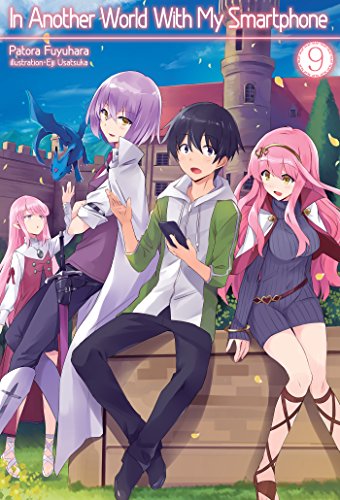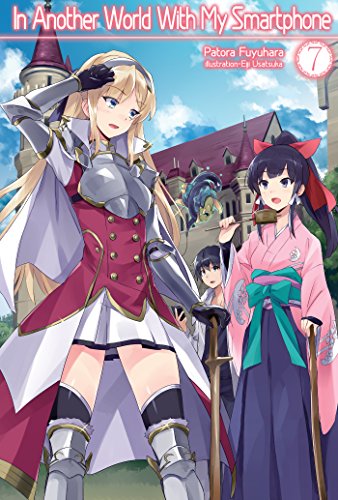By Patora Fuyuhara and Eiji Usatsuka. Released in Japan as “Isekai wa Smartphone to Tomo ni” by Hobby Japan. Released in North America digitally by J-Novel Club. Translated by Andrew Hodgson.
I’ve frequently described In Another World with My Smartphone as being “entertaining but not good”, and that applies just as much to this volume as it does to the others before it. There’s no real plot beyond “watch what Touya does next”, the characterization can vary depending on what needs to happen, and the author’s tendency (and he’s hardly alone in this regard) in writing all his human villains as ugly, whining petty and completely 100% evil is wearing a bit thin. On the other hand, there was some brief attempt at backstory and depth for the Phrase, of all things, which made me very interested in what was going to happen next with them. (not much, at least not in this book.) And honestly, seeing Elze gleefully punching things with her giant robot would put a smile on anyone’s face. Smartphone is dumb fun. Emphasis on the dumb, yes, but also emphasizing the fun.
We start off with another Phrase invasion, which gives us an opportunity to talk some more with Ende, who is clearly connected with them in some way (as we see in the backstory I mentioned above), but who otherwise continues to be Kaworu-lite. There’s another kingdom with a waffling, non-assertive leader, whose scientific advisor (the eeeeeeeevil villain of the book I mentioned above, though he’s also super pathetic) shows off his wood glems as being just as good if not better than Touya’s powered suits. Spoiler: they aren’t. We also go back to Eashen, which is dealing with more internecine wars, and would probably be far more entertaining if I was up on the actual history. And we also meet the leader of a magic-heavy kingdom… who’s actually far more like the other kings we’ve met, as it was his now dead brother who had all the magic powers. He’s just a big powerful guy. He’s also in love with Lu’s sister, which gives Touya another boisterous in-law, to his chagrin.
If it sounds like nothing happens in this book, you’re not wrong. There are lots of events, and several things occur which look like setup for a larger plot down the road. In addition to the Phrase stuff, there’s also Sakura, who still has amnesia and still isn’t a wife (damn you, anime spoilers). She finds a dark elf with a tragic past… which we don’t find out about, but she gets to join the Royal bodyguards anyway. And Touya keeps meaning to tell the other girls that he’s from another world, but still hasn’t gotten around to doing so, despite hints from his “sisters” (who also grace the cover, along with Sakura) that he needs to do thins sooner rather than later. Taken individually, these scenes are mildly irritating at worst and a lot of fun at best. But they’re the opposite of someone like Ryohgo Narita in Durarara!!, who sets up dozens of plot guns over a few books, then fires them all off. This is the adventures of Touya wandering around and seeing what happens next, and occasionally using his godlike powers.
I mean, I’m still reading it. It’s still entertaining. But it’s also still not very good.





